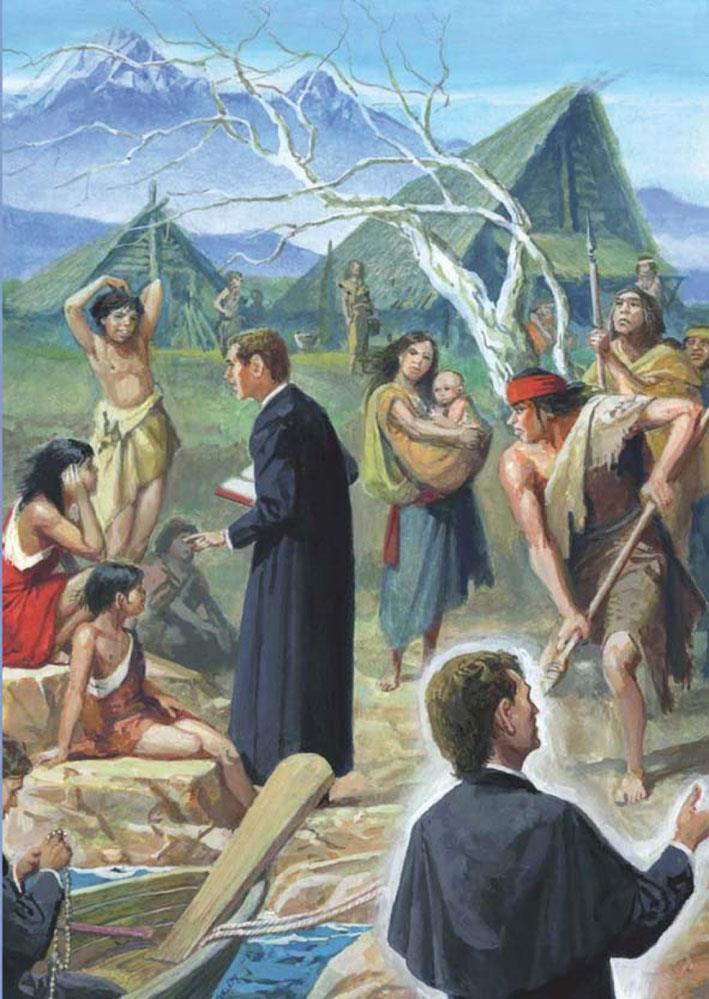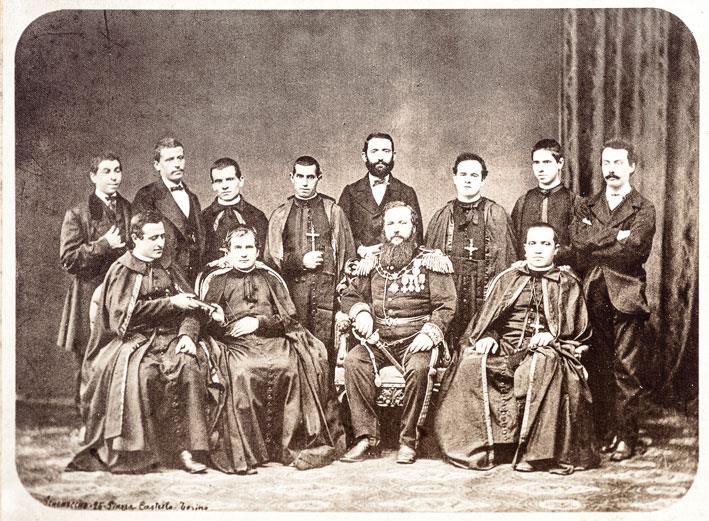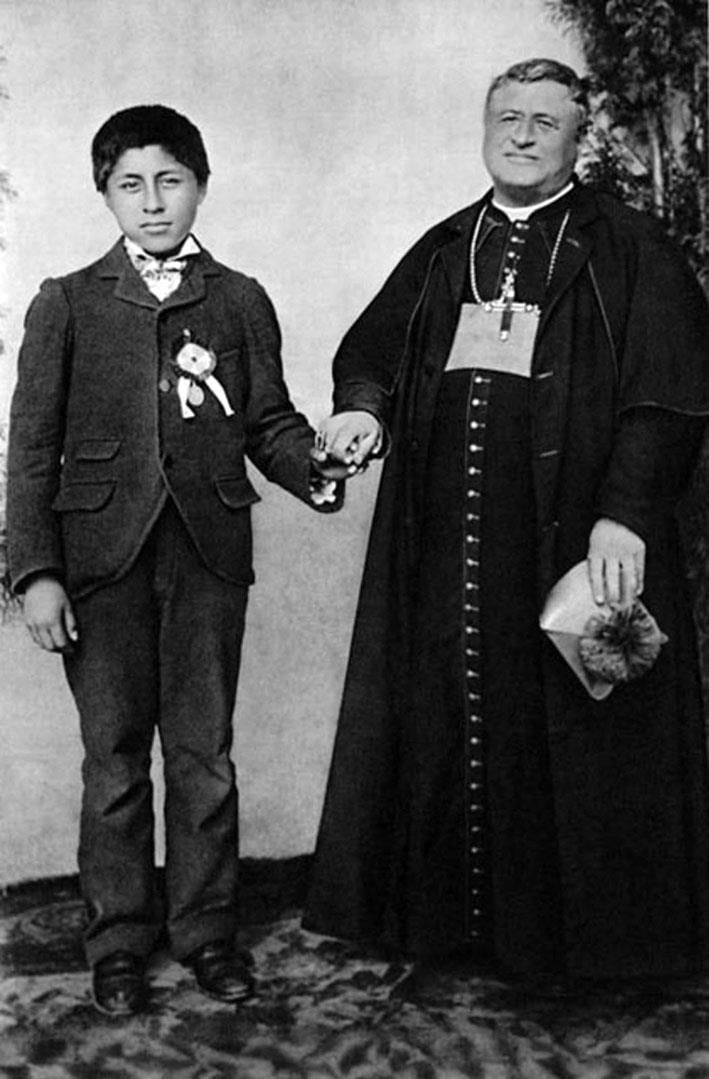Don Bosco, the saint of young people
For many people, St John Bosco needs no special introduction. He is a popular saint renowned for dedicating his life for the welfare of young people, especially the poor and deprived.
As a newly-ordained priest in the city of Turin in northern Italy, he was moved by the plight of hundreds of young people who had come from the countryside to the city looking for work, but who found themselves in dire situations, struggling to survive.
Through his friendly approach he was able to reach out to them and create an environment where they felt welcomed and very much at home. He encouraged them to express themselves freely through sports, music and drama but to keep far away from anything that was harmful or sinful. He also taught them basic skills in different trades to make them more employable.

Don Bosco's missionary zeal
Yet Don Bosco is also known for his great missionary zeal. Even though he never went personally to the missions, yet his love for the missions was quite remarkable and he was able eventually to send his own Salesians to Patagonia, the very southern part of south America, which is quite literally the end of the world.
This year 2025 is a very special year for us Salesians for it marks the 150th anniversary of the first Salesian missionary expedition. It was on 11 November 1875 when Don Bosco gave the missionary cross to 10 Salesians in the Basilica of Mary Help of Christians, which he had built in homage to Our Lady.
The group consisted of 10 Salesian brothers and priests, led by Fr John Cagliero, one of his most talented Salesians who would eventually become the first Salesian bishop and later cardinal.
In his homily to the missionaries, Don Bosco urged them to seek souls and take special care of the sick, the children, the aged, and not to go after honours or dignities. "Who knows," he concluded, "whether this departure for the missions, this humble beginning may be like a little mustard seed from which a mighty tree will grow?"

It all started with a dream
Don Bosco always had a love for the missions, ever since he was young. Actually, he did once make an attempt as a young priest to enrol in a missionary society, but was discouraged by his spiritual director Don Cafasso, who knew that Don Bosco was prone to sea-sickness and would not be able to travel far.
But this did not discourage Don Bosco from his missionary ideal which remained ever in his heart. Just as, at the age of nine, a dream was to set him on his vocational journey, once again, a dream triggered again his love for the missions.
Around 1872 he dreamt of a group of Salesian missionaries who were able to reach a group of indigenous people, where other missionaries before them had failed miserably. Firmly believing that this dream was divinely inspired, he tried to identify the group of indigenous people he saw so vividly in his dream.
He started researching and making enquiries. After carefully going through the many requests he had received from various bishops on the missions, he eventually became convinced that the people he saw in his dream were the native Indians of Patagonia.
Once convinced, it was not long before contact was made with the civil and ecclesial authorities to plan and prepare for this first missionary expedition.
It is good to keep in mind that initially not everyone agreed with Don Bosco to send out missionaries. The Salesian Society was still in its infancy, barely 15 years since its foundation. The number of confreres was limited. Many advised him to first consolidate his congregation before taking on such a bold initiative.
Yet Don Bosco still went ahead, convinced that this missionary venture was divinely inspired. He was to later have four more significant missionary dreams in the following years which guided him and in which he even saw the future development of Salesian work throughout the world.
The most renowned of these dreams is the one where he saw a map of the world with a line extending from Santiago in Chile, across Africa, and reaching Beijing in China. He was told in the dream by his guide that along this line there will be 20 significant Salesian formation centres from which so many vocations would come.

Missionary expansion across the world
During his lifetime, Don Bosco was to send in all 11 missionary expeditions. His successors kept up the tradition of consigning the missionary cross to new missionaries. The ceremony has been held every year ever since (except during the two world wars), sometimes even twice a year for these last 150 years.
During this time various missionary projects were undertaken that helped spread the congregation throughout the world: the first missionary journeys to the Americas initiated in 1875, the bold venture towards Asia in 1906 and Project Africa in 1978.
From that same Marian Basilica of Mary Help of Christians from where Don Bosco had sent his first missionaries, more than 10,700 Salesians and 3,500 Salesian sisters, (who joined in the expeditions from 1877), have received the missionary cross and sent to different parts of the world.
It goes without saying that this consistent commitment in sending out missionaries every year, led to the rapid expansion of the Salesians in the world. Today Salesians number 14,476 and are to be found in all five continents in 136 different countries, having reached a peak in the 1960s of over 22,000.
Don Vecchi, the eighth successor of Don Bosco, attributed the rapid expansion of the Salesian congregation to the missionary generosity which Salesians have shown over the years, making it one of the largest congregations in the Church. Even the renowned Fulton Sheen commented: "The Salesians remind me of the multiplication of loaves and fishes."
A renewed missionary outlook
The Church is, of its very essence, missionary. Therefore, whereas in the past some countries used to send missionaries while others "on the missions" received them, the new approach is that now all countries in the five continents send missionaries, while equally all countries receive missionaries.
Actually, we are now seeing that the largest number of missionaries are coming from Africa and Asia. It is quite moving to see the rector major consigning the missionary cross to so many young African and Asian Salesians. Even Malta is benefitting from their presence here.

The Salesian missionary spirit
As Salesians, we are true missionaries of the young in every part of the world and youth is our "mission land". The Salesians have inherited not only Don Bosco's predilection for the young, but also in a particular way, his ardent missionary spirit.
Fr Paul Albera, the second successor of Don Bosco, summed up Don Bosco's missionary spirit this way: "The missions were the favourite subject of his discourses, and he knew how to instil in hearts such a keen desire to become missionaries that it seemed the most natural thing in the world ... for Don Bosco the second aim of his congregation had to be that of the missions and nothing kept him from embracing it in all its breadth."
That is why Cardinal Ángel Fernández Artime, the outgoing rector major, insists quite emphatically that "we all share responsibility for the evangelising and missionary work of the Salesians of Don Bosco throughout the world".

Give thanks, rethink, renew
The slogan chosen to mark this very special anniversary of Salesian Missions, which coincides with the Jubilee Year of Hope, is Give Thanks, Rethink, Renew. While we are grateful for the gift of so many missionaries over the years, one needs to re-evaluate so as to be able to relaunch this missionary enterprise.
For us, to commemorate this historic milestone means getting in touch with our history to recover the courage of those first Salesian missionaries who were not afraid to go to the peripheries, to the ends of the world, to bring the Gospel to all people. That is why we are marking this anniversary, not only to commemorate the 150 years that have passed, but also to relaunch the missionary vision of Don Bosco and commit ourselves to the 150 years that lie ahead.
Fr Richard Ebejer, a Salesian of Don Bosco, is an experienced educator and priest with a long-standing commitment to accompanying young Salesians. His missionary work has taken him to Ghana, Nigeria, Tunisia and Ireland. He currently serves as a member of the Chaplaincy team at MCAST